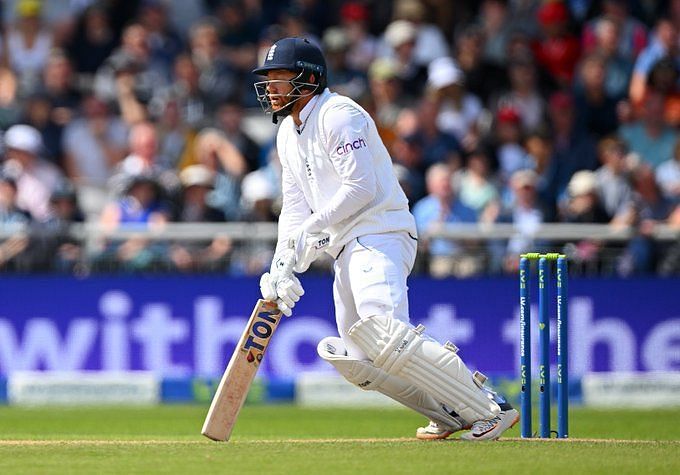
Raise the stakes and Jonny Bairstow will rise further
Jonny Bairstow is never far away from the spotlight. When the Ashes began, people were waxing lyrical about how he had not missed a beat with the bat, registering a fifty at the first time of asking. Then, the murmurs around his untidiness with the gloves grew into clamors.
At Lord’s, the conversation was around whether he was right to leave his crease when he did, and if he was a tad unlucky to get run out by Alex Carey the way he did.
Prior to the fourth Ashes Test at Old Trafford, though, the discussions had taken a more serious turn and were suddenly concerning his place in England’s first-choice Test side.
A bit of it might have been unwarranted. Bairstow, before a freak injury ruled him out for several months in 2022, was the best Test batter on the planet. He was churning out hundreds for fun and was doing so while demolishing bowling attacks.
But there was some reason why people wanted Ben Foakes to replace Bairstow. Catches were going down quite regularly, and there was a real worry that by side-lining a specialist keeper, England would grass a chance that would turn the game completely.
Add to that how evenly poised the Ashes series was, and it does not take rocket science to figure out that the stakes were high. Not just from a personal standpoint for Bairstow, but also because of just what this Ashes series means to a set of cricketers who are daring to change the format forever.
If you thought Bairstow would crack under this pressure and crumble, giving skeptics a chance to question his credentials further, well…you have perhaps not watched him enough.
At Old Trafford, England had fashioned themselves a strong position, rolling Australia over for 317 and then rattling along to 437-5 from just 83.1 overs. With the forecast bleak for the weekend, though, a 180 to 200-run lead did not seem enough because it might have forced England to bat again, which inclement weather might not have allowed.
So, even at 437-5, there was plenty that England needed to get right to propel themselves into a situation where a home win became the likeliest outcome. The need for quick runs, coupled with what was at stake, only played into Bairstow’s hands.
Bairstow sizzled his way to 99, helping England to a 275-run lead
He set out to do what he is best at, without really worrying about what failure would entail. Part of that credit goes to his teammates, but nothing can be taken away from the way Bairstow batted, the manner in which he farmed the strike and kept attacking, almost knocking the wind out of Australia’s sails.
The wicketkeeper hit 10 fours and four mammoth sixes. With every shot, there was a sense of arrogance, metaphorically smirking at those who thought he was not good enough to be playing this game. He also stitched together a 66-run final wicket partnership with James Anderson. Anderson only scored five of those, with 50 of the runs coming off Bairstow’s bat.
As fate would have it, Bairstow was stranded on 99 – a mere ball after he turned down the opportunity of a very risky second run. Had he gotten there, he could have made England's second-fastest hundred in the Ashes.
That is not the point, though. This knock was not about the one run he did not get, but rather about the 99 that he did. And, of course, about how he stood up when it really mattered for England.
This is, in many ways, very similar to what happened during the 2019 ICC ODI World Cup. England, after shock defeats to Pakistan and Sri Lanka, were running the risk of not reaching the semi-final of their home World Cup campaign.
Their batting was not clicking as well as it was doing prior to the competition, and there were just a few moans and groans of discontent. Among all of this, they had to navigate past India and New Zealand to ensure that they would contest the semi-final.
Bairstow scored a century in each of those games and ensured that England blitzed past their opponents. At the time, he was even quoted as saying that people in the media wanted “England to fail”. Instead of getting engaged in a war of words, though, he let his bat do the talking.
In the last iteration of the Ashes, England looked completely out of sorts. By the time they arrived in Sydney, the Ashes had already been lost, and avoiding a whitewash was the only incentive left. Bairstow’s thumb took a battering courtesy of Pat Cummins, yet, he looked adversity in the eye and mustered a first-innings hundred. England ended up drawing that game.
A little later in 2022, when India came knocking at Edgbaston, England found themselves under all sorts of strife in the first innings. The visitors had put up 416, with Ravindra Jadeja and Rishabh Pant scoring hundreds.
India then reduced England to 83-5 and Bairstow was not just batting against a highly-skilled bowling attack led by Jasprit Bumrah, but also those asking whether his cavalier style, which had fetched him centuries earlier in the summer, could be sustainable against high-quality opposition.
The wicketkeeper looked scratchy at the start but once Virat Kohli poked the bear, he unleashed mayhem. A 140-ball 106 followed, and he backed it up with an unbeaten 114 as England hunted down 378 in the fourth innings at Edgbaston against India.
This Old Trafford special, thus, should not come as a surprise. If anything, people should be asking what took Bairstow so long to come to the party. Maybe the stakes were not as high previously. Maybe he needed the Ashes to be on the line and a situation where he could definitively shut up all those asking whether this approach could work.
Whatever that may be, when the stakes were raised, Bairstow rose further. This is not the first time this has happened either. And it might not be the last either.


